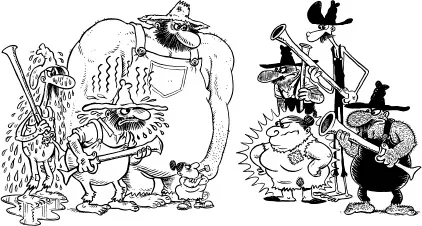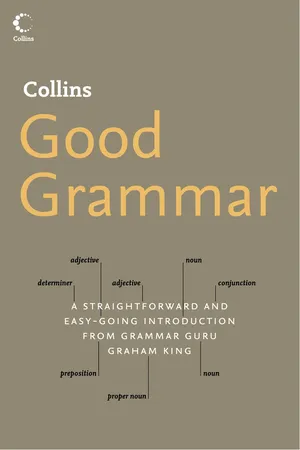eBook - ePub
Collins Good Grammar
About this book
An invaluable guide to the world of good grammar which breaks down the barriers that prevent so many articulate, intelligent people from communicating effectively.
Tools to learn more effectively

Saving Books

Keyword Search

Annotating Text

Listen to it instead
Information
Adjective or Adverb?
Both adjectives and adverbs describe things, but in different ways. Adjectives add extra meaning to nouns while adverbs help tell us how, why, when and where things happened. So, can you tell which of these are adjectives, and which are adverbs?
1.She is a bright girl who talks quickly.
2.It’s the large white house over there.
3.Of all the younger boys she liked James the least.
4.Of the older pair Phoebe is the taller of the two.
5.Look at that old dog, fast asleep.
(Adjectives: bright, large, white, younger, older, old; Adverbs: quickly, there, least, taller, fast)
Describing Things: Adjectives and Adverbs
Adjectives define and modify nouns and pronouns while adverbs do the same for verbs, adjectives and other adverbs. They are two big families of words, interrelated and often difficult to tell apart, which is why we sometimes misuse or abuse them. Nor are they always amicable; as with the Martins and McCoys or the Montagues and Capulets, a bit of inter-family feuding goes on. It’s therefore useful to learn all we can about adjectives and adverbs and how we can use them to better effect.
Here’s a sentence in which the meaning depends almost entirely on adjectives and adverbs:
You’re buying the best, | adjective |
most | adverb |
expensive, | adjective |
exciting | participle used adjectivally |
and arguably | adverb |
highest performance | adjective / noun |
saloon | noun used adjectivally |
car. | noun |
There are four kinds of modifier in that sentence: three adjectives, two adverbs, a participle (a verb turned into an -ing adjective) and two nouns (performance, saloon) that are used in an adjectival way.
Writing a sentence like that is a bit like juggling four balls in the air, but most of us manage to do it tolerably well without too many mishaps.

ADJECTIVES AND ADVERBS: Inter-family feuding
In the chapter on Parts of Speech we found that adverbs could be identified by their -ly endings. That’s fine for adverbs with -ly endings, but there are many without, and there are also some adjectives with -ly endings. It is these that cause confusion:
ADJECTIVES | ADVERBS |
He is a slow driver. | He drives slowly. |
She is an early riser. | She always rises early. |
That’s very loud music. | John’s playing loudly. |
Further confusion is caused by the same word doubling as adjective and adverb:
ADJECTIVE | ADVERB |
It was a straight road. | Anne drove straight home. |
She took the late train. | Brian was always late. |
He read a daily newspaper. | He reads a paper daily. |
Obviously we must be wary of adjectives and adverbs that don’t play by the rules.
We’ve all seen road signs that say GO SLOW! and perhaps wonder, on reflection, if it ought to say GO SLOWLY! It may be that we have a subconscious awareness that slow in SLOW LANE is an adjective, and that slowly, because of its -ly suffix, is an adverb, and therefore the sign should warn us to GO SLOWLY. That would be grammatically correct but the road engineer would argue the safety benefits of brevity and few today would dispute the usage. The following adverbial examples, however, are not regarded as good usage:
She put her lips to his ear and spoke soft. | (softly) |
I’m afraid I’ve let him down... |
Table of contents
- Title Page
- Contents
- The Thirteen Gremlins of Grammar
- Introduction
- What is Grammar? Why use it?
- You know more about grammar than you think: Test
- Grammar Test Answers and Scorecard
- Let’s look at Sentences
- The building blocks of sentences: Parts of Speech
- Naming things: Nouns
- You, me and other Pronouns
- It’s a plane! It’s a bird! No! It’s Superverb!
- Describing things: Adjectives and Adverbs
- Grammatical glue: Determiners, Conjunctions, Prepositions
- Punctuation: What’s the point?
- Punctuation: Devices for separating and joining
- Punctuation: Symbols of meaning
- Writing good English: The Elements of Style
- Index
- Keep Reading
- About the Author
- Writing Guides by Graham King
- Copyright
- About the Publisher
Frequently asked questions
Yes, you can cancel anytime from the Subscription tab in your account settings on the Perlego website. Your subscription will stay active until the end of your current billing period. Learn how to cancel your subscription
No, books cannot be downloaded as external files, such as PDFs, for use outside of Perlego. However, you can download books within the Perlego app for offline reading on mobile or tablet. Learn how to download books offline
Perlego offers two plans: Essential and Complete
- Essential is ideal for learners and professionals who enjoy exploring a wide range of subjects. Access the Essential Library with 800,000+ trusted titles and best-sellers across business, personal growth, and the humanities. Includes unlimited reading time and Standard Read Aloud voice.
- Complete: Perfect for advanced learners and researchers needing full, unrestricted access. Unlock 1.4M+ books across hundreds of subjects, including academic and specialized titles. The Complete Plan also includes advanced features like Premium Read Aloud and Research Assistant.
We are an online textbook subscription service, where you can get access to an entire online library for less than the price of a single book per month. With over 1 million books across 990+ topics, we’ve got you covered! Learn about our mission
Look out for the read-aloud symbol on your next book to see if you can listen to it. The read-aloud tool reads text aloud for you, highlighting the text as it is being read. You can pause it, speed it up and slow it down. Learn more about Read Aloud
Yes! You can use the Perlego app on both iOS and Android devices to read anytime, anywhere — even offline. Perfect for commutes or when you’re on the go.
Please note we cannot support devices running on iOS 13 and Android 7 or earlier. Learn more about using the app
Please note we cannot support devices running on iOS 13 and Android 7 or earlier. Learn more about using the app
Yes, you can access Collins Good Grammar by Graham King in PDF and/or ePUB format, as well as other popular books in Languages & Linguistics & Grammar & Punctuation. We have over one million books available in our catalogue for you to explore.
